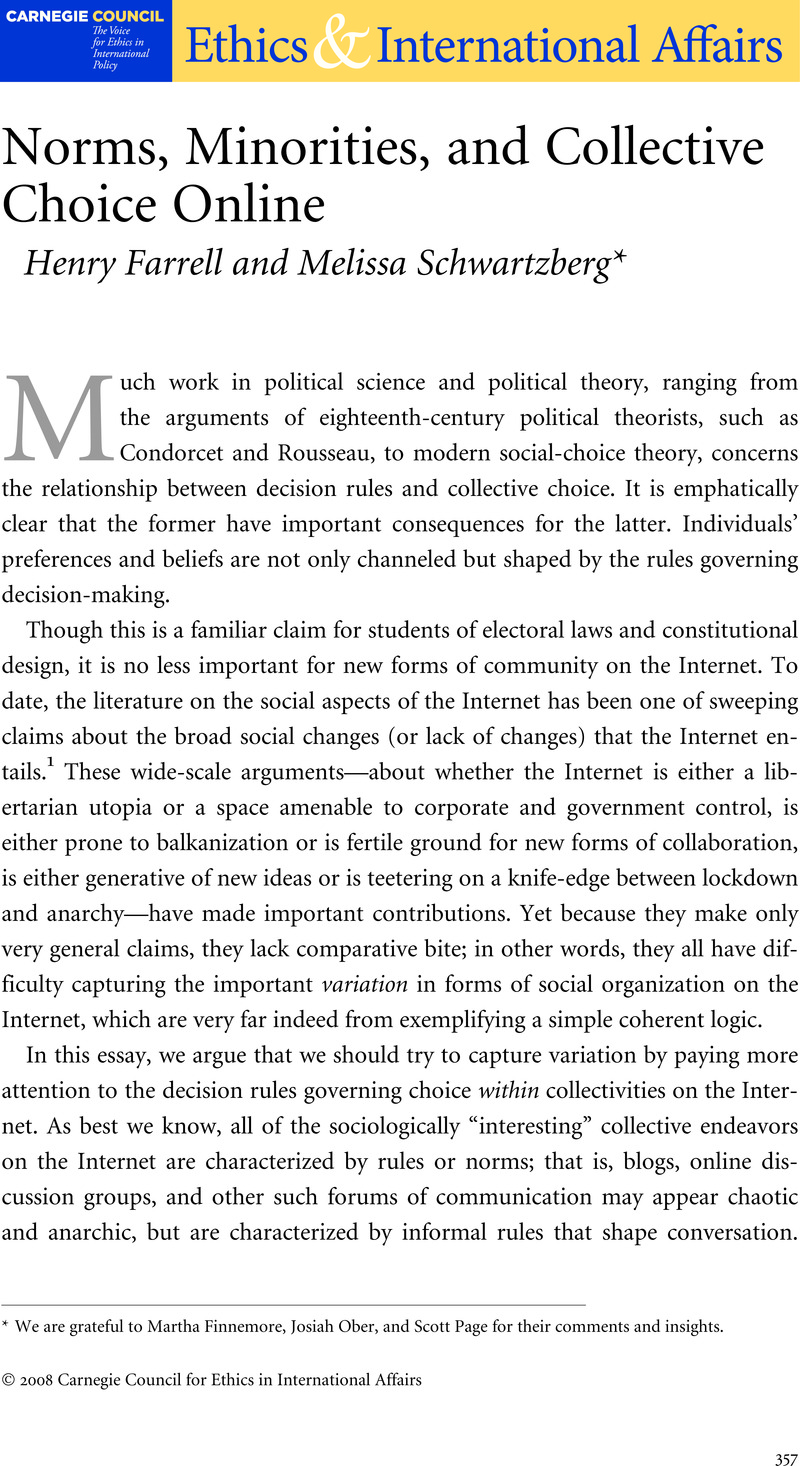Published online by Cambridge University Press: 25 March 2011

1 See David R. Johnson and David G. Post, “The Rise of Law in Cyberspace,” Stanford Law Review 48 (1996), p. 1367; Lawrence Lessig, Code and Other Laws of Cyberspace (New York: Basic Books, 2000); Cass Sunstein, “Neither Hayek nor Habermas,” Public Choice 134 (2008), pp. 87–95; Yochai Benkler, The Wealth of Networks: How Social Production Transforms Markets and Freedom (New Haven, Conn.: Yale University Press, 2006); and Jonathan Zittrain, The Future of the Internet—And How to Stop It (New Haven, Conn.: Yale University Press, 2008).
2 Douglass C. North, Institutions, Institutional Change, and Economic Performance (Cambridge: Cambridge University Press, 1990) and Jack Knight, Institutions and Social Conflict (Cambridge: Cambridge University Press, 1992).
3 Lessig, Code and Other Laws.
4 Although as Internet-based social projects, such as Wikipedia, generate adjudication mechanisms, the line between informal rules and formal ones is blurring.
5 Benkler, The Wealth of Networks.
6 See Fernanda B. Viégas, Martin Wattenberg, and Matthew M. McKeon, “The Hidden Order of Wikipedia,” Human-Computer Interaction 15 (2007), pp. 445–54; Travis Kriplean, Ivan Beschastnikh, David W. McDonald, and Scott Golder, “Community, Consensus, Coercion, Control: CS*W or How Policy Mediates Mass Participation,” in Proceedings of the ACM 2007 International Conference on Supporting Group Work (GROUP, 2007); Ivan Beschastnikh, Travis Kriplean, and David W. McDonald, “Wikipedian Self-Governance in Action: Motivating the Policy Lens,” in Proceedings of the 2008 AAAI International Conference on Weblogs and Social Media (ICWSM, 2008); and Zittrain, The Future of the Internet.
7 See, for example, this account: en.wikipedia.org/wiki/Wikipedia:Administrators’_noticeboard/IncidentArchive276#User:Gerry_Lynch_Unfairly_blocked_as_a_sockpuppet.
8 en.wikipedia.org/wiki/Wikipedia:Three-revert_rule.
9 In principle, anyone who has been a regular Wikipedia user for a period of time, is familiar with Wikipedia policies, and does not receive too many objections from others when she applies, will become an administrator. We are unaware of any research that investigates whether there is significant divergence between principle and practice.
10 See further, en.wikipedia.org/wiki/Wikipedia:Resolving_disputes.
11 See Viégas et al., “The Hidden Order of Wikipedia.”
12 Aniket Kittur, Bongwon Suh, Bryan Pendelton, and Ed Chi, “He Says, She Says: Conflict and Coordination in Wikipedia,” in CHI 2007: Proceedings of the ACM Conference on Human Factors in Computing Systems (San Jose: ACM Press, 2007).
13 Kriplean et al., “Community, Consensus, Coercion, Control.”
14 Philippe Urfalino, “Apparent Consensus and Voting: Two Modes of Collective Decision-Making,” (April 29, 2006); available at cesta.ehess.fr/docannexe.php?id=332.
15 Urfalino, “Apparent Consensus,” pp. 20–22.
16 For a discussion of the potential moral benefits associated with acknowledging probable error in the face of overwhelming disagreement, see Melissa Schwartzberg, “Voting the General Will: Rousseau on Decision Rules,” Political Theory 36 (2008), pp. 403–23.
17 This may prove uncongenial to some theorists of deliberation, although it may be quite compatible with other accounts of deliberation, such as Jack Knight and James Johnson, Politics, Institutions, and Justification: A Pragmatist Theory of Democracy (forthcoming), which stress that clashes of interest may often be irresolvable.
18 Henry Farrell, “Bloggers and Parties: Can the Netroots Reshape American Democracy?” Boston Review (September/October 2006).
19 Interview with Markos Moulitsas Zuniga, July 2006.
20 Mike Lazzaro, “Moderate This! Kos’ Tech Tricks for Traffic, Trolls, and Threads That Won't End,” Mother Jones, June 26, 2007.
21 Henry Farrell, Eric Lawrence, and John Sides, “Self-Selection or Deliberation? Blog Readership, Participation, and Polarization in American Politics” (July 1, 2008); available at ssrn.com/abstract=1151490.
22 Zittrain, The Future of the Internet.
23 Scott E. Page, The Difference: How the Power of Diversity Creates Better Groups, Firms, Schools, and Societies (Princeton, N.J.: Princeton University Press, 2007).
24 Sunstein, “Neither Hayek nor Habermas.”
25 Terry Moe, “Political Institutions: The Neglected Side of the Story,” Journal of Law, Economics, and Organization 6 (1990), pp. 213–54; and Knight, Institutions and Social Conflict.